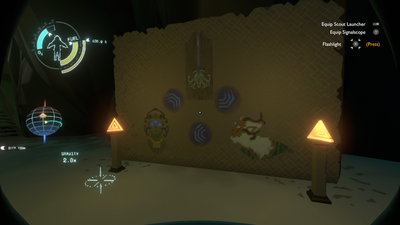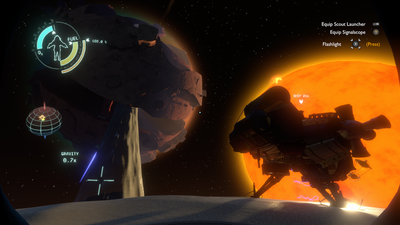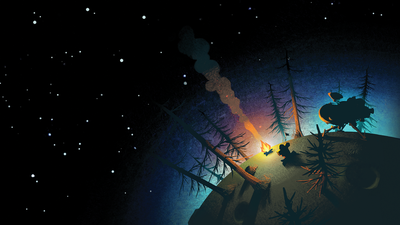Outer Wilds
Against the backdrop of a diorama solar system in a diorama universe, Outer Wilds plunges forward into an ambitious adventure of wonder and exploration. You play as the sixth member of your species to venture out into space — and the first to do so with a translation device for the language of the Nomai, an ancient species that mysteriously disappeared a long time ago. Remnants of their civilization are scattered all around your solar system, like bread crumbs in a nonlinear trail, inviting you into their mystery. What were the Nomai doing? Where did they go? What’s it all for?

I enthusiastically recommend Outer Wilds to anyone who will listen; it’s a resounding 10/10. I love the world and its inhabitants, and their ideals to explore and to understand. The music frequently brings me to a very emotional place (more on that in a moment). But this game’s best quality is its unique ability to engage players at the intersection of imagination and discovery: learning new information pushes you to form new questions, which in turn makes you seek new answers, and then the cycle repeats. The nonlinear narrative supports your curiosity in whatever direction you decide to go; there are no artificial checkpoints or cutscenes pushing you towards a specific experience. The way you engage with this world is your own.
Outer Wilds is surprisingly capable at blending the whimsy and brutality of space exploration. Your spaceship is made of wood, of all things, and yet is often your only life support in the cold void of space. Plummeting into a black hole is surprisingly non-lethal, but what awaits on the other side is nevertheless crushingly isolating. Extremely bizarre things happen on a regular basis — like getting launched from a planet into low orbit only to crash back down — but manage to feel more bemusing than terrifying.

And the music! Funnily enough, when I fired up Outer Wilds for the first time, I didn’t make it past the main menu. I was captivated by the title track. As I watched the little campfire come to life, the theme’s dueling banjos sang optimism and hope into the deep black of space. The composer, Andrew Prahlow, layers a bright foreground he recorded just before development wrapped with a background that he’d recorded seven years prior — a detail that’s both beyond incredible and very difficult to appreciate without having first finished the game. Suffice it to say, this is my favorite game soundtrack, and I’ve listened to many.

Lastly, Outer Wilds achieves a mark of masterclass sci-fi, wrapping the vast happenings of the universe into a story that is deeply personal. It sets us off asking questions about physics and ancient anthropology but, along the way, teaches us to ask questions of ourselves. How could we be more open-handed and filled with wonder, like the Nomai? What do we do with the memories of people and experiences long gone? How can we live bravely in the face of a constantly uncertain future?
It’s tempting to linger in this moment, while every possibility still exists. But unless they are collapsed by an observer, they will never be more than possibilities.